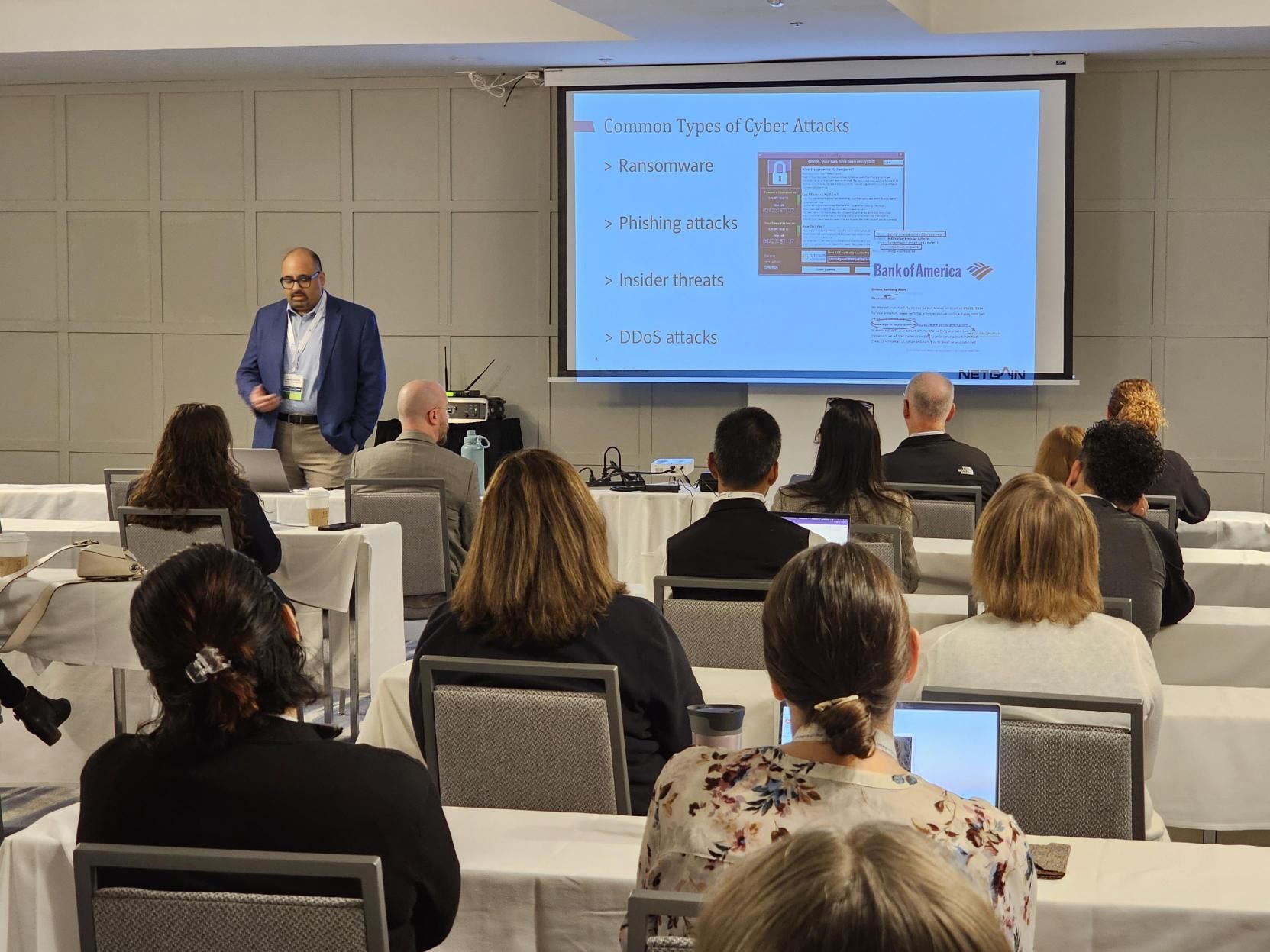Netgain CISO, Kshitiij Kathurria Presenting on Cybersecurity at the MGMA Conference
The Netgain Healthcare team attended and exhibited at the MGMA New England Regional Conference, “Becoming Agents of Change: Mission Possible” at Massachusetts picturesque Sea Crest hotel on Cape Cod last week. The schedule was full of well-attended, content-rich sessions including one presented by our very own CISO, Kshitiij Kathurria on “Don’t Let Compliance Drive Your Cybersecurity.”
Here are my three takeaways related to IT management from the event:
1. Cybersecurity is top of mind for organizations of all sizes.
Timely however unfortunate, the same week as the conference, two major Massachusetts health insurers suffered a ransomware attack. While the specific details associated with this breach are not yet defined, it is likely that the operational downtime and liabilities resulting from this incident will be significant. With the average cost of a data breach in the United States costing $9.44M, healthcare providers and hospitals know they need to ensure that their data is safe and that they have done all they can to fortify their security posture with multiple layers of protection. But how do they ensure that they can eliminate threats and reduce their risk?
To protect themselves from cyber threats, healthcare organizations should implement a multi-layered security approach that includes both technical solutions and employee training. Technical solutions can include firewalls, anti-virus and anti-malware software, intrusion detection and prevention systems, and encryption. Employee training is critical, as human error can often lead to security breaches. Employees should be trained on best practices for creating strong passwords, identifying, and reporting suspicious activity, and avoiding phishing scams. Regular security assessments and audits can also help identify vulnerabilities and areas for improvement.
With the continuous evolution of threats and technology, organizations need to consider a more proactive approach to cybersecurity so that they can reduce their risk of a data breach and protect their patients’ sensitive information.
2. Technology debt negatively affects patient care.
Healthcare providers have spent years accumulating technology debt (tech debt), such as not re-factoring their software applications, implementing modern security practices or upgrading their foundational infrastructure. As a result, they are spending an inordinate number of resources – time, effort, and expenses – to maintain legacy systems. In addition to the cost, organizations are at a greater security risk due to the myriad of technology layers that they have created. Rather than invest in technology upgrades that could grow with their organization, they used solutions that were “good enough.” As time goes on, that accumulated technology debt becomes difficult to upgrade and creates significant security vulnerabilities.
Organizations are recognizing that they need to address their tech debt now because the lack of prior investments is creating significant operational challenges to how providers are delivering care to their patients.
3. Providers must modernize their information technology footprint or face significant operational and security risks.
Healthcare organizations suffering from tech debt must modernize their infrastructure, or they will negatively impact patient care. There are several implications for organizations that do not modernize their IT. These implications include:
Increased Costs: Legacy systems are expensive to maintain and require frequent upgrades and patches. They also lack the scalability and flexibility that modern solutions offer. As a result, healthcare providers may end up spending more on hardware and software maintenance costs, as well as lost productivity due to outdated technology.
Security Risks: Legacy systems are more vulnerable to cyber-attacks, as they may not have the latest security patches or updates. This can put sensitive patient data at risk, potentially resulting in data breaches and loss of trust from patients.
Reduced Efficiency: Older systems may not be as efficient as newer technologies, leading to slower workflows, longer wait times, and decreased patient satisfaction.
Limited Access to Data: Legacy systems may not have the same level of interoperability with other healthcare providers, making it difficult to share patient data and collaborate with other providers.
Compliance Issues: Healthcare regulations and standards are constantly evolving, and legacy systems may not be able to keep up with the latest requirements. This can result in compliance issues and potential fines or legal penalties.
Organizations that fail to modernize their infrastructure will be left behind or worse, the victim of a cyber-attack. Therefore, it is essential for healthcare providers and hospitals to stay up to date with the latest technologies and invest in modernizing their infrastructure to provide the best possible care for their patients.
Conclusion
MGMA New England Regional Conference provided valuable insights for healthcare providers to stay ahead of the game in a constantly evolving landscape. The takeaways gleaned from the conference highlight the importance of addressing tech debt, improving cybersecurity measures, and modernizing infrastructure.
Failure to address these issues will result in increased costs, security risks, reduced efficiency, limited access to data, and compliance issues for healthcare providers. It’s essential for healthcare providers and hospitals to invest in the latest technologies and modernize their infrastructure to provide the best possible care for their patients while keeping their data safe and secure. By doing so, they can remain competitive and ensure the long-term success of the organization.
